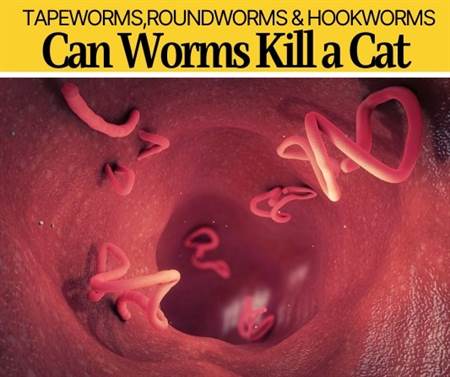 Do you have cats that might have been exposed to skunk spray? Are you worried that your kitten will be eaten by a skunk? If you’re wondering how to keep your cats protected from Skunks…
Do you have cats that might have been exposed to skunk spray? Are you worried that your kitten will be eaten by a skunk? If you’re wondering how to keep your cats protected from Skunks…
In this guide you will learn:
- Why skunks might attack a cat,
- The risks of skunk spray and bites & How to Protect your Cat from Skunk,
- If Skunks can actually kill and eat a Cat or a Kitten.
How to spot a skunk? Look for a medium-sized black animal with a stripe on its tail. Skunks are not picky in terms of where they set up shop, but it will usually be near a water source.
You can find skunks in forests, open grasslands and urban areas. This means that you are likely to live near a skunk, no matter where your home is.
Why Would A Skunk Attack A Cat?
While skunks are not known to intentionally prey on cats, there are some instances in which the two animals may get tangled in a fight.
For example, if a skunk and a cat are in the same outdoor area, they may get into a fight. In this case, skunks can inflict severe damage upon a cat by using their long claws.
With these claws skunks can leave deep gashes on a cat’s body, causing a great deal of bleeding and potential damage.
A skunk can also use its ability to spray to be effective in a fight against a cat.
When they spray into a cat’s eyes, it results in severely impacted eyesight for the feline. In some cases, it can lead to a total loss of vision.
Are Skunks Actually Known To Bother And Attack Cats?
As mentioned before, skunks are not likely to purposefully bother or attack cats.
Generally, skunks recognize that certain animals are larger than they are. Cats fall into this category.
In order to avoid conflict and protect themselves, skunks will not seek out a fight with a cat.
However, if a cat challenges a skunk, it will stand its ground and fight back.
You may be wondering do feral cats and skunks get along? No, they don’t. These animals will avoid each other if possible, fighting only if they are in close quarters or are preying on the same smaller animal.
One of the biggest concerns if your cat is attacked or bitten by a skunk is the threat of rabies.
Because skunks are in the top three most rabid animals in the US (bats and racoons being the first two), it is highly likely that a bite from one of these creatures can lead to a case of rabies for your pet.
Always treat a skunk bite with extreme caution and visit the vet as soon as you have the opportunity.
Cats Getting Sprayed By Skunks
While skunk spray may not harm your cat permanently, it can cause some irritating side effects.
One of the most dangerous areas for a cat to get sprayed by a skunk is it’s eyes. When skunk spray enters the eyes, it causes irritation and redness.
What should you do if this happens to your cat? Act quickly and flush the eyes with water. You can also use products that are specifically manufactured for this purpose, such as Nutri-Vet Cat Eye Cleaner.
If your cat inhales skunk spray, this can lead to a variety of symptoms. These might include vomiting or sneezing repeatedly. In this case, it is best to pay your cat’s vet a visit.
While it may not result in any long term harm, skunk spray can occasionally result in the development of anemia in your cat, otherwise known as kidney failure.
Lastly, there is the more obvious side effect of an unpleasant smell left on your cat. There are many home remedies floating around to cure the scent left behind by a skunk. Many of these are safe to use, but may not be completely effective.
Instead, try mixing together hydrogen peroxide, baking soda and hand soap and massaging it onto your cat. Rinse off after your cat’s hair is thoroughly coated.
Remember, always check with your vet before using something new on your cat.
Do Skunks Kill Cats?
While there are many animals that prey on cats, both wild and domesticated, the skunk is not one of them.
There are situations in which a cat and a skunk may get into a fight, but usually the skunk is not seeking the cat out to kill it.
Skunks recognize that they may not fare well against the power of a cat. Occasionally, skunks will kill kittens, as they are easier targets due to their small size.
If you have a cat with bites around the neck and if you are wondering if skunks bite cats in the neck…
Not necessarily. A skunk will bite whichever area is most convenient for them.
They will not strictly aim for a cat’s neck.
Left to their own devices however, a skunk will not go out of its way to kill a cat.
Do Skunks Eat Cats?
Skunks will not often eat grown cats. Because they don’t attack cats, they usually don’t have the opportunity to eat them.
In some cases, skunks will kill and eat very small kittens if they are left unattended. This is because kittens are smaller and more defenseless than a grown cat.
This means that a skunk can be sure of its safety before it attacks.
Do Skunks Eat Dead Cats?
In addition to kittens, skunks occasionally feed on cats that have already died. This includes roadkill or cats that have been killed and abandoned by other predators.
Why might this happen? If skunks are very hungry, they will eat whatever is available to them, including prey that has already been killed.
Do Skunks Snatch & Eat Kittens?
While skunks generally leave larger cats alone, they do sometimes snatch and eat very small kittens.
Because a skunk’s diet usually consists of smaller rodents, like rats and mice, the size of a kitten is much more manageable for them to eat.
In addition to being small, kittens are more defenseless and less likely to fight back than a grown cat.
In the interest of self-preservation, skunks will forsake grown cats for their weaker babies.
Signs That A Skunk May Have Eaten Your Kitten
So, how do you know if a skunk actually ate your kitten?
As unpleasant as it is, there are usually remains left behind accompanied by a pungent scent.
As opposed to a snake or a rat, both of which frequently eat kittens and leave behind no remains, skunks will not generally eat all the parts of the animal.
Skunk VS Large Cat – Who Would Win in a Fight?
Skunks range in size from 7 ounces to to 14 pounds and can reach lengths of up to 19 inches. This means that they can often be similar in size and weight to your average house cat.
Now, who would win in a fight if you pitted a skunk against a large house cat? There are a number of factors to consider.
One of those factors is speed. An average house cat can run at speeds up to 30mph while a skunk can hit speeds up to 10mph. This gives an advantage to the house cat.
Both creatures have fairly strong night vision and should be able to see well, regardless of whether the fight takes place in the day or night.
Another factor to consider is the predatory nature of each animal. A cat is designed to prey upon small animals and can be quick and fast in its attack. While a skunk will also eat smaller rodents, it is generally less aggressive than a cat. Advantage cat here.
Lastly, skunks have the ability to spray. If it sprayed a cat effectively and ran away, it would escape just fine.
So who would win, cat or skunk?
That depends on your definition of winning. A cat would be more likely to kill a skunk in a fight, but a skunk can easily use its ability to spray and flee the scene.
Skunks Eating Cat Food
A common concern for many pet owners is whether or not a skunk might eat their cat’s food. Because skunks are scavengers, they do eat whatever is easily available to them.
This means that if you have an outdoor cat and you leave their food bowl outside, the chances of a skunk coming by to take a nibble are pretty high.
To avoid skunks eating your cat’s food, simply take the bowl inside as soon as the cat is finished eating.
You can also consider keeping the food indoors and having your pet feed inside rather than outdoors.
Protecting Cats From Skunks
For the most part, your cat will not need too much protection from skunks unless they are very small kitten.
In that case, it is safest to keep your kitten indoors until it is large enough to defend itself against predatory animals if necessary.
Remember, skunks are usually looking for easy targets which makes cats unappealing to them.
If your cat does happen to be attacked by one of these creatures, call the vet immediately to get your pet the care that it needs.
Related Questions
Are Skunks Related To Cats?
Because they do share some similarities in size, it might be tempting to ask if skunks are related to cats.
Skunks belong to the Mephitidae family, which also includes stink badgers. This means that the closest relative to a skunk would be a stink badger.
They are also closely related to weasels. However much they have in common, skunks are more closely related to dogs than they are to cats.
Do Skunks try to Mate with Cats?
The short answer here is no, skunks do not try to mate with cats. Skunks will only try to mate with their own kind, which is to say, other skunks. Cats and skunks cannot have babies together.
If for some reason, a cat and a skunk were to mate, they would not be able to reproduce.






